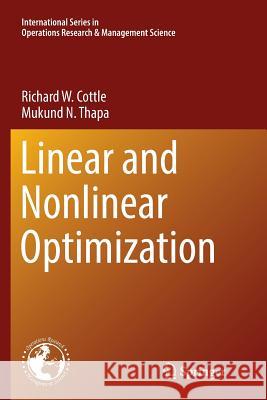Linear and Nonlinear Optimization » książka



Linear and Nonlinear Optimization
ISBN-13: 9781493983797 / Angielski / Miękka / 2018 / 614 str.
Linear and Nonlinear Optimization
ISBN-13: 9781493983797 / Angielski / Miękka / 2018 / 614 str.
(netto: 383,36 VAT: 5%)
Najniższa cena z 30 dni: 385,52
ok. 22 dni roboczych.
Darmowa dostawa!
"The historical notes in the book are interesting and well placed. ... The book's list of important references is quite complete. ... this book is destined to become a classic in the field for beginning graduate students in optimization." (S. Zlobec, Mathematical Reviews, January, 2018)
Chapter 1. LP Models and Applications.- Chapter 2. Linear Equations and Inequalities.- Chapter 3. The Simplex Algorithm.- Chapter 4. The Simplex Algorithm Continued.- Chapter 5. Duality and the Dual Simplex Algorithm.- Chapter 6. Postoptimality Analysis.- Chapter 7. Some Computational Considerations.- Chapter 8. NLP Models and Applications.- Chapter 9. Unconstrained Optimization.- Chapter 10. Descent Methods.- Chapter 11. Optimality Conditions.- Chapter 12. Problems with Linear Constraints.- Chapter 13. Problems with Nonlinear Constraints.- Chapter 14. Interior-Point Methods.
This textbook on Linear and Nonlinear Optimization is intended for graduate and advanced undergraduate students in operations research and related fields. It is both literate and mathematically strong, yet requires no prior course in optimization. As suggested by its title, the book is divided into two parts covering in their individual chapters LP Models and Applications; Linear Equations and Inequalities; The Simplex Algorithm; Simplex Algorithm Continued; Duality and the Dual Simplex Algorithm; Postoptimality Analyses; Computational Considerations; Nonlinear (NLP) Models and Applications; Unconstrained Optimization; Descent Methods; Optimality Conditions; Problems with Linear Constraints; Problems with Nonlinear Constraints; Interior-Point Methods; and an Appendix covering Mathematical Concepts. Each chapter ends with a set of exercises.
The book is based on lecture notes the authors have used in numerous optimization courses the authors have taught at Stanford University. It emphasizes modeling and numerical algorithms for optimization with continuous (not integer) variables. The discussion presents the underlying theory without always focusing on formal mathematical proofs (which can be found in cited references). Another feature of this book is its inclusion of cultural and historical matters, most often appearing among the footnotes.
Professor Ilan Adler,
IEOR Department,
UC Berkeley
Michael P. Friedlander,
IBM Professor of Computer Science,
Professor of Mathematics,
University of British Columbia
1997-2026 DolnySlask.com Agencja Internetowa
KrainaKsiazek.PL - Księgarnia Internetowa









